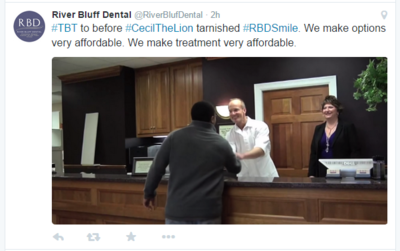Last week, the unfortunate death of Cecil the Lion sparked international outrage. A 13-year-old resident of Hwange National Park in Zimbabwe, Cecil was beloved - a leader of two prides and a symbol of the area's harmonious relationship with protected wildlife. Since the story broke, Walter Palmer, the U.S. dentist who participated in the illegal hunt has experienced grave repercussions, highlighting the importance of building and sustaining social capital in today's hyper-connected world.
- Mr. Palmer paid compensation in the amount of $50,000 to experts hired to guide the hunt.
- The lion was intentionally lured away from the safety of the preserve and shot with a bow and arrow.
- The hunt lasted some 40 hours, after which time Cecil was killed and beheaded.
- Walter claims he adhered to the law, following all expressed protocol during the hunt
The Power of the "Shareable Sentiment" and Social Capital
There's no escaping the impact of this tragic error - the international community has been particularly vocal about its disdain for both Mr. Palmer and the barbaric details surrounding the event. The power of the shareable sentiment is immediately clear, and the collective value, or social capital he may have had has been quickly destroyed.
In the aftermath, the Internet has hunted the hunter:
- Hundreds of poor reviews were posted on his business Yelp page, despite Yelp's effort to contain the chaos.
- Similarly, hundreds of one star reviews show on his Google page, including comments such as "He lured me into his dental practice, then shot me with a bow and arrow".
- A parody Twitter account for his business has been convincing enough to spur protest tweets using the hashtag, #LionsLivesMatter.
- BBC reports that a similar hashtag, #CeciltheLion, has been used 250,000 times in the last 24 hours.
- Fellow hunters have also been critical, and Safari Club International has suspended his membership.

A tweet from the parody Twitter account.
As a result of widespread condemnation, Mr. Palmer's dental practice has been closed, forcing him to go into hiding.
However, the event has also spurred unprecedented support for wildlife preservation. More than $475,000 has been raised in efforts to promote wildlife preserve research. 300,000 signatures have been collected, petitioning the president of Zimbabwe to stop granting licenses to hunt. Within days of news coverage, over 175,000 signatures called for Mr. Palmer's immediate extradition from the country, prompting Zimbabwe to start extradition proceedings.
The Internet has created a new level of connectedness that is staggering. As a consequence, all endeavors, both positive and negative, are instantly shareable. Social capital is vital - it has a tangible impact on profits. For Mr. Palmer, this misstep cost him his livelihood and his reputation.
Lessons Learned: What Corporate Can Take Away From the Tragedy
Who participates in virtual social capital the most? Surprise: Generation X, Millennials and Generation Z. Understanding these generations is key to learning from Cecil's story. Here are some key insights to take away:
1. For the next generation, Underlying Purpose Trumps Legality. Bad decisions are made each and every day - some legal, others not. The tragedy of Cecil the Lion highlights the fact that it's not the legality surrounding an activity that matters most to Millennials, but rather, underlying purpose. For Mr. Palmer, no one cared that he may have been improperly guided, or that the experts he relied on were mistaken about which animals were legal to hunt and kill. The international community viewed his purpose as immoral, and not in line with the social good. As a result, he is finished, both professionally and personally.
2. The Internet Has the Potential to Engage, Incite and Galvanize Across Many Communities. Mr. Palmer's actions prompted a swift and passionate response, resulting in broad support for the issue of wildlife protection. In the past, adults or specific groups may have had the most impact to make change happen. The Internet is the ultimate equalizer and therefore, the audience is much broader.
The Internet is far-reaching, and impassioned events - both negative and positive, can incite a reaction that can support or hinder your organization's mission, purpose, or cause. Consider the influence and rallying force of Elon Musk or Richard Branson, both who are well respected by Millennials and Generation Z, primarily because of their effective use of social media. Many companies struggle to market to Millennials. And not surprisingly, few of them have truly invested in building effective social capital.
3. Transparency Is Critical to Build Social Capital. We often talk about having a strong employer brand to attract Millennials and Generation Z talent. What does that mean? Savvy businesses understand that when corporate strategy and culture align with the online community, positive social capital builds. 24-hour, 2-way communication capability makes transparency even more important. You are no longer presenting an image; you have an active audience ready to question and understand your true purpose.
Chances are, if you have something to hide, social media will expose it. The NFL is a great example. It's been challenging for the brand to manage the negative PR surrounding some player's actions. In this case, cultural change may be the key.Having no presence can be riskier than having spent the time to build a neutral social presence.
Social Capital Matters
As an employee, it used to be said that you shouldn't say something you wouldn't want reported in the Times tomorrow. Today, the danger is much greater. Walter Palmer damaged his own livelihood because of an inability to understand the import of online social networks and collective value. Social capital matters. Whether you are an individual or an organization, your voice online will be heard, and by a greater audience than who you market to offline. Long gone are the days of having complete control of your image and perception. Like Mr. Palmer now realizes, the power of people is huge and the conversation is two-way.
How does your social capital measure up? Does your PR team coach leaders on the online communication that best resonates with the next generation? Internally, what steps have you taken to build positive social capital? Externally, does your employer brand build positive social capital?

